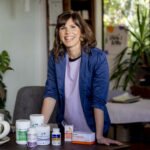A super common symptom associated with IBS pain is BLOATING. Bloating is a big sign that your gut just isn’t coping with all it has to do. It’s incredibly common among “busy” people, who are always on the go!
Here are the TOP 5 MISTAKES I see people doing again and again when it comes to trying to ‘self-treat’ bloating:
1. Eating a restrictive low-fodmap diet. This is a very common diet used to reduce symptoms of bloating, that most people find when they Dr Google “how to get rid of the bloat”. It is also often recommended by gastroenterologists or dieticians, when medical scopes and blood tests come back as “fine.” While I have nothing against using such a diet in healing protocols, I DO have a problem when people go on restrictive diets long-term to reduce gut symptoms, without understanding or treating WHY they are bloating in the first place when they eat healthy foods like onion or apples. A healthy body SHOULD be able to eat healthy foods.
2. Taking random gut supplements. Look, I think it’s great you’re trying out natural supplements like probiotics and digestive enzymes to try and address the bloat. But honestly, randomly taking pills RARELY addresses the root cause of the bloating, which is why one of our core principles in our practice is to test not guess. Once you actually KNOW what is happening deep down in your gut, you can then use targeted support – much more effectively.
3. Taking anti-spasmodic medication. Ok, so this isn’t really ‘self-treating’ as you need a GP script to get such drugs. But again, these types of medication only relax the smooth muscles of the gut, they DON’T address why your gut is twisted up and inflamed in the first place. Plus these drugs can have nasty side-effects like causing drowziness, blurred vision and constipation (ummm, more bloating!!!).
4. Holding onto wee. This is a random one, hey?! It’s not really a self-treat method, but it’s a problem many rushing women have which can literally CAUSE (or exacerbate) bloating. If you’re so busy that you can’t go to the toilet regularly, your bladder will no doubt be very full for most of the day, which can cause the sensation of abdominal bloating, and even IBS cramping. Pee people, pee!
5. Not acknowledging that stress plays a big part. Yes ma’am / sir. I get it, life can feel hectic. You can feel like you don’t have enough time in your day. You’re juggling work and kids and housework and volunteer work and the gym and all the other things women pile onto their ‘to-do’ list. And even though your bloating is becoming a BIG ISSUE, you can’t work out how you can reduce your stress-load, you don’t know how to get off this merry-go-round of madness, even though deep down you KNOW your gut is more aggravated the more overwhelmed you are.
P.s. If you’re struggling with gut issues, food sensitivities and your relationship with food, I’m running a Root Cause of Emotional Eating Webclass on Mon 22 May 7pm for Natural Medicine Week. It’s free! And you can sign up here.


